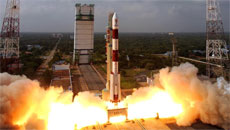Pluto is almost largely unknown to us and it is so far away that even the powerful Hubble Space Telescope strains itself to see it.
Come July 14, 2015, NASA's New Horizons spacecraft is scheduled to make a close flyby of that distant world, a first for any spacecraft from the Earth, and show what the dwarf planet has in store.
No one knows what to expect when the alien landscape comes into focus - there could be icy geysers, towering mountains, deep valleys, even planetary rings.
"Because Pluto has never been visited up-close by a spacecraft from the Earth, everything we see will be a first," said Adriana Ocampo, program executive for NASA's New Frontiers programme at NASA headquarters in Washington, DC.
"I know this will be an astonishing experience full of history making moments," Ocampo noted.
The best images so far show little more than Pluto's shape (spherical) and colour (reddish).
Over the years, changes in those colour patterns hint at a dynamic planet where something is happening, but no one knows what.
By late April 2015, New Horizons will be close enough to Pluto to take pictures rivalling those of Hubble - and it only gets better from there, NASA said in a statement.
"At closest approach in July 2015, New Horizons will be a scant 10,000 km above the surface of Pluto. If New Horizons flew over the Earth at the same altitude, it could see individual buildings and their shapes," NASA added.
New Horizons' flyby of Pluto will occur almost exactly 50 years after Mariner 4's flyby of Mars in July 1965, revolutionising knowledge of the Red Planet.
"Whatever we find, I believe Pluto and its satellites will surpass all our expectations and surprise us beyond our imagination," Ocampo added.

